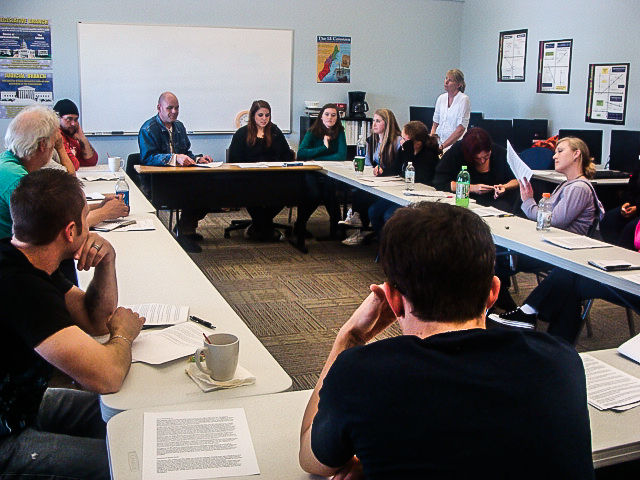Stories connect community
Led by professor Rachel Smydra, the English 200 class entitled ‘Making Literary Connections’ encourages students to not limit themselves to the four walls of a university lecture hall. Instead, she wants the largely freshman class of 14 to take the lessons they learn and share that with the outside world.
Last Thursday, a group of Oakland students met for their biweekly English course. However, instead of assembling in their normal Pawley Hall classroom, they gathered at a homeless shelter in Pontiac, roughly six miles away from campus.
Led by professor Rachel Smydra, the English 200 class entitled ‘Making Literary Connections’ encourages students to not limit themselves to the four walls of a university lecture hall. Instead, she wants the largely freshman class of 14 to take the lessons they learn and share that with the outside world.
“Reading literature in a classroom always generates good discussion, however moving students off campus facilitates a different kind of experience that allows them to rethink how they themselves connect to course material,” Smydra said. “In this case, having students lead large and small group discussions exposes them to different interpretations, life experiences, the importance of listening and methods of fostering connections to discuss universal themes.”
By the end of the month, Smydra’s class will make three trips to Grace Centers of Hope, the largest and oldest homeless shelter in Oakland County. Established in 1942, the non-profit Christian organization offers a rehabilitation campus for men, women and children who have abused drugs, alcohol or a combination of both.
Fifteen residents from Grace Centers, aged 20 to 57, are participating in the sessions, which involve the reading of a short story out loud followed by open dialogue within the entire group.
“We haven’t done anything like this before,” said Kim Philip, Director of Education and Career Development at Grace Centers. “I hope this experience will allow the participants from OU to have more insight into homelessness, and I hope that our residents will gain an appreciation for literature.”
The short stories explore topics such as enchantment, recognition, character development, unreliable narrator and more, spurning lively discussions between the Golden Grizzlies and their newfound classmates.
“Red Seven” by C.B. Christansen was used as the text for the first week. The tale features the death of a loved one in a close knit family and the toll that it takes on the story’s characters. After the reading, the discussions allowed both the students and residents to share their own stories of loss and how they coped and overcame.
Austin Heard, an 18-year-old English major in Smydra’s class led one of the small groups. He boldly told a story of how his older brother died while he was only a young boy. This caused each of the other four members of his group, all Grace residents, to also share a story of the death of someone special.
“I have never done anything like that with other people,” Heard said. “I loved it! It was amazing that I was able to relate and connect with everyone, and I am truly grateful for the experience.”
In Heard’s group, Duane, a member, really enjoyed the proceedings.
“This was something new,” Duane said. “I always loved grammar and literature, but I lost interest in school and was kind of a rebel. I dropped out at 16, and I have never gotten the chance to take a college course.”
Duane, 29, is a recovering heroin addict and was homeless for much of last year. After being clean for 16 months, he relapsed and overdosed. Last Monday marked two straight months of no drugs for Duane, a dorm captain in the program.
“I liked the interaction, and the story wasn’t too complicated,” Duane said. “I have an open mind, and I’d really like to go to college to become an addiction therapist.”
Duane’s story is just one of many that Smydra’s students have learned during this adventure outside the normal classroom.
“Sending the students to Grace Centers allows them to interact, observe and reflect on what people from different backgrounds, educational levels and interests gain from reading a short story,” Smydra said. “I hope the experience makes students engage more fully with a text and that after reading it, the curiosity about the things that make and don’t make sense linger.”








